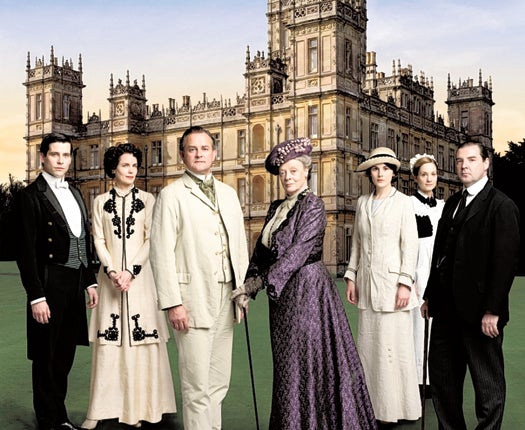Brian Viner: Oh, for the days of parlourmaids

The enduring British fascination with life above and below stairs gets another stoking from Sunday, with ITV's transmission of Downton Abbey, a seven-part drama set in a grand country house just before the First World War and naturally starring, in the regrettable absence of Dame Judi, Dame Maggie Smith.
Comparisons with Upstairs, Downstairs, of ITV and blessed memory, (and incidentally co-created by another of our great dames, Eileen Atkins, the daughter of an under-butler) are inevitable. Writer Julian Fellowes even drowns a couple of his aristocrats on the Titanic, which was also the fate of the lovely Lady Marjorie Bellamy, played by Rachel Gurney, on Upstairs, Downstairs back in October 1973.
He will be a happy Fellowes indeed if the nation gets anything like as immersed in the life of Downton Abbey as it did in the comings and goings at 165 Eaton Place. When Lady Bellamy copped it, a grief-stricken couple in Worcestershire, mistaking fiction for reality, paid their respects by draping their front door with black crepe paper.
However engrossing Downton Abbey proves to be, one can't imagine anything like that happening again. Only reality shows seem to have that kind of grip on the public imagination these days, and if we've changed since 1973, just think how we've changed since 1912.
On Monday my wife Jane and I dropped in on our local stately home, the National Trust-run Berrington Hall in Herefordshire, because we'd heard that they offer a very good below-stairs tour, and since Jane is writing a novel partly set in a big house at the turn of the 20th century, she reckoned the tour would constitute useful research. It did, not least because it was conducted with terrific wit and brio by a woman called Sarah Pedro, proudly dressed as a parlourmaid. And of everything she explained to us about life below stairs a century ago, what struck me most forcefully was how extraordinarily good they were at recycling.
We might think we've got pretty decent at it, with our bottle banks and green wheelie bins, but compared with the Edwardians and their predecessors we are novices. At Berrington Hall the servants saved the contents of every chamber-pot; the urine was left to mature and then used to soak the bed linen, while the solids went on the compost. Leftover cooking fat was sent to the local candle-maker, and cigar ash was mixed into a paste used to clean the cutlery.
And here's another thing: they got their job titles right in those days. You knew where you were with a laundry maid, an under-gardener, a hall porter and so on. By dispiriting contrast, the estimable Sarah Pedro, a guide if ever there was one, sported a badge marked "interpretationassistant".
What did Jane Austen do without Probus?
Sticking with stately homes, last Friday I got to have dinner at one of the stateliest, a black-tie do in the lovely Orangery at Blenheim Palace, social highlight of The Independent Woodstock Literary Festival. The guest speaker was Peter Snow, talking fascinatingly about the Duke of Wellington's military campaigns, the subject of his new book, and dinner duly comprised food from that era, including a delicious consommé just like the one served to Tsar Alexander at the Elysée Palace in August 1815. One up, again, for the past over the present. In another respect, though, we are very much better off than our ancestors were. We know from Jane Austen that leisure activities in the early 19th century, even for the wealthy, didn't amount to much more than hunting, riding, walking and dancing, whereas now we have myriad ways of filling our spare time.
Alongside me at the Blenheim dinner were a charming elderly couple, John and Mary, who live locally in Woodstock (population less than 3,000) and told me that older townsfolk have no fewer than 22 clubs and societies to choose from. One of the most vigorous, said John, is Probus, which I confess I'd never heard of, but is an international organisation for retired professional and business people.
The word Probus is a contraction of pro(fessional) and bus(iness), but John explained that he prefers to think of it as an acronym for Prostate Removed, Other Bits Under Suspicion. I nearly spat out my mouthful of Tsar Alexander's soup.
A northerner's guide to pronunciation
Everyone I've talked to about ITV's remake of Bouquet of Barbed Wire agrees with me that it ended risibly. Regarding the pronunciation of the word "bouquet", however, there seems to be no consensus at all. For some the first syllable rhymes with "goo", for others it rhymes with "go".
This reminds me of the official starter on the Old Course at St Andrews, whose job it is to announce each golfer over a loudspeaker, and who once found himself discombobulated by the name of a Frenchman, a Monsieur Fouquet. Before he switched his microphone on, the starter, a taciturn fellow with a broad Fife accent, had several goes at enunciating Fouquet, but it kept coming out rather unfortunately rhyming with "bucket". "I'm sorry sir," he eventually said to M Fouquet, "but you'll have to answer to the name Patterson."
And that story in turn brings me to a pet hate, which is the way journalists from the south of England present the nation's favourite expletive, when uttered by a northerner, as "fook" or "fooking". Just because we pronounce those words differently from you supercilious southerners doesn't make them wrong, and doesn't require different spelling. And we're not from "oop north", either. So fooking stop it.

Join our commenting forum
Join thought-provoking conversations, follow other Independent readers and see their replies